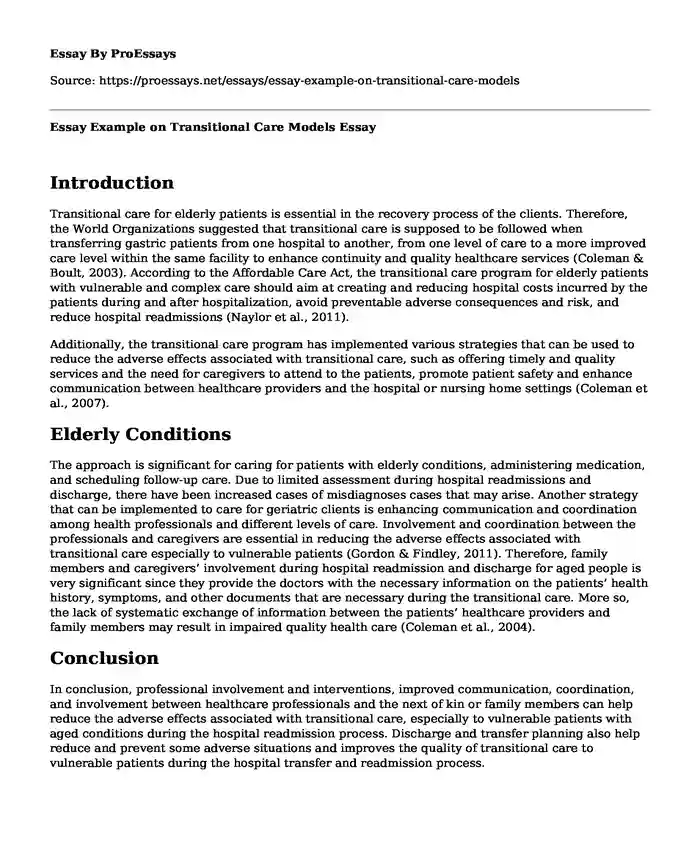Introduction
Transitional care for elderly patients is essential in the recovery process of the clients. Therefore, the World Organizations suggested that transitional care is supposed to be followed when transferring gastric patients from one hospital to another, from one level of care to a more improved care level within the same facility to enhance continuity and quality healthcare services (Coleman & Boult, 2003). According to the Affordable Care Act, the transitional care program for elderly patients with vulnerable and complex care should aim at creating and reducing hospital costs incurred by the patients during and after hospitalization, avoid preventable adverse consequences and risk, and reduce hospital readmissions (Naylor et al., 2011).
Additionally, the transitional care program has implemented various strategies that can be used to reduce the adverse effects associated with transitional care, such as offering timely and quality services and the need for caregivers to attend to the patients, promote patient safety and enhance communication between healthcare providers and the hospital or nursing home settings (Coleman et al., 2007).
Elderly Conditions
The approach is significant for caring for patients with elderly conditions, administering medication, and scheduling follow-up care. Due to limited assessment during hospital readmissions and discharge, there have been increased cases of misdiagnoses cases that may arise. Another strategy that can be implemented to care for geriatric clients is enhancing communication and coordination among health professionals and different levels of care. Involvement and coordination between the professionals and caregivers are essential in reducing the adverse effects associated with transitional care especially to vulnerable patients (Gordon & Findley, 2011). Therefore, family members and caregivers’ involvement during hospital readmission and discharge for aged people is very significant since they provide the doctors with the necessary information on the patients’ health history, symptoms, and other documents that are necessary during the transitional care. More so, the lack of systematic exchange of information between the patients’ healthcare providers and family members may result in impaired quality health care (Coleman et al., 2004).
Conclusion
In conclusion, professional involvement and interventions, improved communication, coordination, and involvement between healthcare professionals and the next of kin or family members can help reduce the adverse effects associated with transitional care, especially to vulnerable patients with aged conditions during the hospital readmission process. Discharge and transfer planning also help reduce and prevent some adverse situations and improves the quality of transitional care to vulnerable patients during the hospital transfer and readmission process.
References
Coleman, E. A., & Boult, C. (2003). Improving the quality of transitional care for persons with complex care needs. Journal of the American Geriatrics Society, 51(4), 556-557.
http://pascal-francis.inist.fr/vibad/index.php?action=getRecordDetail&idt=14805423
Coleman, E. A., Parry, C., Chalmers, S. A., Chugh, A., & Mahoney, E. (2007). The central role of performance measurement in improving the quality of transitional care. Home Health Care Services Quarterly, 26(4), 93-104. https://doi.org/10.1300/J027v26n04_07
Coleman, E. A., Smith, J. D., Frank, J. C., Min, S. J., Parry, C., & Kramer, A. M. (2004). Preparing patients and caregivers to participate in care delivered across settings: the Care Transitions Intervention. Journal of the American Geriatrics Society, 52(11), 1817-1825.
https://doi.org/10.1111/j.1532-5415.2004.52504.x
Gordon, M., & Findley, R. (2011). Educational interventions to improve handover in health care: a systematic review. Medical Education, 45(11), 1081-1089.
https://doi.org/10.1111/j.1365-2923.2011.04049.x
Naylor, M. D., Aiken, L. H., Kurtzman, E. T., Olds, D. M., & Hirschman, K. B. (2011). The importance of transitional care in achieving health reform. Health Affairs, 30(4), 746-754.
https://doi.org/10.1377/hlthaff.2011.0041.
Cite this page
Essay Example on Transitional Care Models. (2024, Jan 11). Retrieved from https://proessays.net/essays/essay-example-on-transitional-care-models
If you are the original author of this essay and no longer wish to have it published on the ProEssays website, please click below to request its removal:
- Research Paper Example on Internet Addiction
- Adequate Staffing vs. Inadequate Staffing in Nursing - Term Paper
- Equipoise in Research - Essay Sample
- Article Analysis Essay on Nurse Burnout
- Essay Example on Sustainable Practices: Hospitality Companies' Push for Positive Change
- Modern Hospitals: Complexity & Cost of High Quality Care - Essay Sample
- Essay Example on Nutrition: Essential Nutrients for Optimal Health







